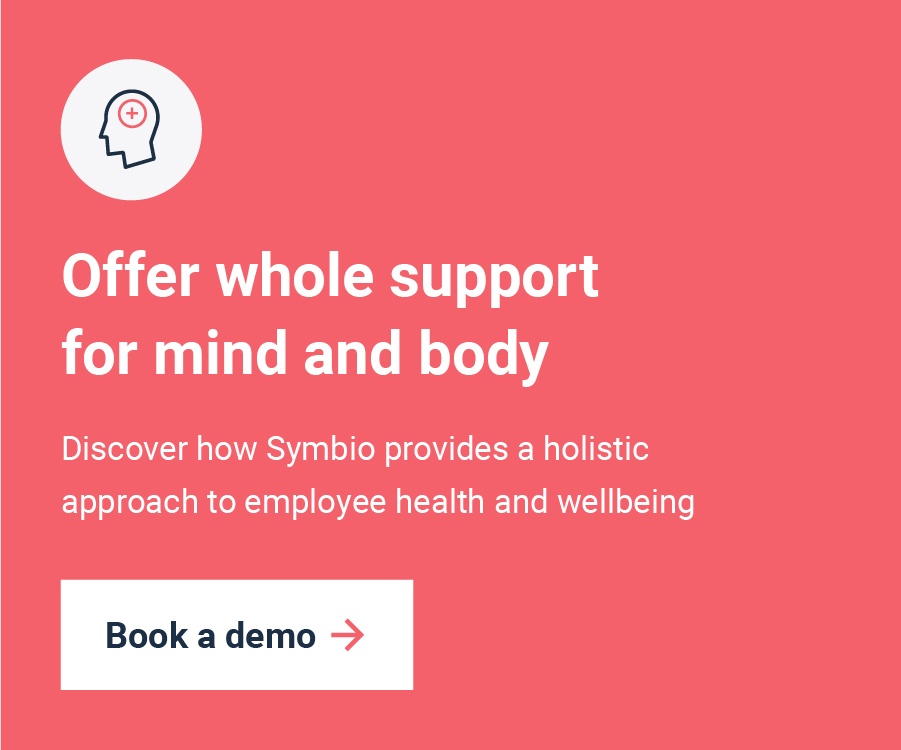Sleep issues are common and frustrating, with 71% of UK adults not getting the recommended 7 to 9 hours a night.
The longer someone experiences a sleep issue, the more harmful it can be to their mental and physical wellbeing. It can result in problems like cardiac issues, depression, dementia and diabetes.
Similarly, this can have some seriously negative impacts on your business. Burnout, irritability, poor performance, and low productivity are just a few problems that can arise from poor sleep.
Put simply, sleep matters. And the earlier you can help resolve an issue or disorder, the better.
In this blog, we’ll help you understand common sleep issues and disorders a little better. Plus, we offer tips to help you support your employees to get a healthier, happier and more restful night.
What are common sleep issues and disorders?
74% of UK adults have reported a recent decline in sleep quality. That makes it highly likely several people in your workforce suffer from sleep issues. Some of the most common issues include:
Insomnia
Insomnia is a common sleep disorder that makes it hard for sufferers to fall or stay asleep. They may wake up too early or several times during the night and often don’t feel rested after sleep. Some people experience short-term insomnia due to acute stress, poor sleep, or stimulants. For others, it can last much longer.
Restless leg syndrome
Restless leg syndrome - also called Willis-Ekbom disease - is a condition where the sufferer involuntarily twitches their legs before or during sleep. This sensation can creep across the feet, calves and thighs, resulting in an unpleasant jolt that interrupts rest.
Narcolepsy
Narcolepsy is a rare and chronic neurological disorder where the brain cannot regulate sleeping and waking patterns. This means a person can fall asleep suddenly or feel extremely tired during the day. They can also experience excessive dreaming, a temporary loss of muscle control and sleep paralysis.
Sleep apnea
Sleep apnea is when a person’s breathing stops and starts during sleep. Usually caused by excess body weight, the throat and tongue muscles can block a sufferer's airway and lower oxygen levels in the blood. This causes their brain to think they can't breathe, and they wake up (sometimes without even realising it) so the airways can reopen. Symptoms include loud snoring, gasping for air and a dry mouth or headache in the morning.
How can sleep issues impact people’s lives?
Poor sleep impacts every aspect of life. The effects can range from minor irritants to serious health complications.
Loss of productivity
Trying to work without having adequate sleep impacts productivity. A lack of mental clarity makes it tricky for employees to do even the simplest tasks. Without enough sleep, people can be inattentive and struggle to absorb new information, which is never ideal in the workplace. Their ability to concentrate and pay attention also declines.
Increase in mistakes
Without enough good quality rest, employees are likely to make more mistakes. Twice as many compared to their well-rested colleagues. Depending on your sector and the employee’s role, this could be something inconvenient - but ultimately harmless - like an email typo. However, if the job is physical, mistakes could be costly and dangerous for them, colleagues or clients.
Stress and irritability
Feeling tired because of a lack of sleep can lead to irritability. We’ve all been there. However, persistent sleep issues can cause significant stress for the sufferer. You may notice this if an employee frequently becomes impatient, angry or hostile with colleagues or clients.
Mental health issues
Poor sleep often leads to anxiety and depression. And without good quality rest, these mental health issues can worsen. It’s an unpleasant and tricky cycle to escape and can lead to employees struggling to cope with everyday life.
Heart disease
Sleep helps your body eliminate the stress hormones that negatively affect blood pressure. Employees who don’t get enough sleep are at risk of developing high blood pressure and heart disease. Researchers have also found that a good night’s sleep can reduce the risk of fatty plaque build-up in the blood vessels that can lead to heart disease. A lack of sleep deprives an individual of this natural defence.
Diabetes
Not enough sleep can cause insulin resistance, which increases hunger and cravings for high-sugar and high-carb food. This can result in weight gain and diabetes, which further affects sleep quality. It’s another vicious cycle that’s hard to break.
What causes sleep issues and disorders?
There's often not a single cause behind a sleep issue or disorder but rather a few different things at play.
Mental health issues
Sleep and mental health have a close relationship, with stress and anxiety being two of the most common causes of poor sleep.
Worrying about hectic work and life schedules, workplace matters, or money can cause anxiety and make falling or staying asleep difficult. 1 in 4 UK adults says money worries negatively impact their night's rest.
That lack of sleep can cause tiredness during the day, making it difficult to cope with everyday tasks. This can lead to low self-esteem, worry and stress, which continues to keep them up at night.
Poor sleep can also affect the ability to focus and concentrate. It could also trigger depression, feelings of suicide, psychosis or paranoia.
Physical and neurological conditions
Various underlying physical and neurological conditions can cause insomnia or sleep issues. For those living with physical and neurological conditions, poor-quality sleep can worsen their symptoms. Some of the more common underlying conditions include:
- A lack of hypocretins (the chemicals in the brain that regulate wakefulness, motivation, and appetite) can lead to narcolepsy.
- The hormonal changes experienced during the menopause can similarly cause disruption to the normal regulation of sleep.
- Many types of infections can cause sleep issues, as well as the medicines used to treat them.
- Restless leg syndrome and the chronic pain of Parkinson’s disease can make falling and staying asleep difficult.
Finally, sleep apnea can be caused by a range of ailments, including high blood pressure, asthma, type 2 diabetes and polycystic ovary syndrome.
Lifestyle factors
Many lifestyle factors, such as a poor sleeping environment, can have a huge, detrimental impact on sleep and sleep quality. This includes a noisy or bright room, an uncomfortable bed or feeling too hot or cold.
If an employee travels for work, the resulting jet lag can cause sleep issues. And shift work is one of the most harmful factors regarding regular, quality sleep.
Unhealthy lifestyle habits - such as excessive caffeine, alcohol and nicotine consumption or a lack of exercise - don’t help either.
Some medications
Trouble falling or staying asleep can be a side effect of over-the-counter and prescription medications.
Some heart medications can make people sleepy during the day and potentially lower the body’s melatonin levels. This is the hormone that helps control sleep cycles.
Statins, used to lower cholesterol levels, can also lead to muscle pains that make sleeping difficult. And antidepressants change how your brain cells communicate, commonly leading to insomnia.
Similarly, it’s good to be aware that over-the-counter medications like antihistamines, decongestants and pain relief tablets often contain caffeine.
Help treat the causes and symptoms of sleep issues in your workforce
The number of hours you sleep matters, with the NHS recommending a healthy adult needs around 7 to 9 a night.
If an employee struggles to get that amount, it may not be an immediate cause for concern. Life can get busy and cause changes to our sleeping habits. Significant events, such as starting a new job or moving house, can temporarily affect sleep. But ultimately, they shouldn’t have a lasting effect on health and wellbeing.
However, if you think an employee is experiencing chronic sleep issues, it’s important to have measures in place to support them.
Give access to counsellors and Employee Assistance Programmes
Talking therapies can be hugely beneficial if a mental health issue is the underlying cause of poor sleep.
Providing an Employee Assistance Programme means your workforce can easily access counselling services tailored to their needs.
Share personalised wellbeing content
General health and wellbeing content is always helpful. It can reassure somebody that they’re not alone in what they’re experiencing.
However, by personalising this content as our Symbio app does, employees can reap the rewards of information and recommendations specific to their health concerns.
More than this, it can help them manage their conditions to feel more in control.
Provide access to virtual GPs
It’s increasingly difficult to secure a GP appointment, and when you do, it often falls in the middle of the work day. Offering 24/7, unlimited access to GPs, by video and phone can take a massive weight off an employee’s mind.
With fast, flexible and unlimited access to GPs and healthcare experts, your workforce can start remedying their sleep issues or the underlying mental and physical causes.
-1.jpg?width=1600&height=900&name=image%20(21)-1.jpg)

-1.jpg?width=800&height=450&name=image%20(16)-1.jpg)


